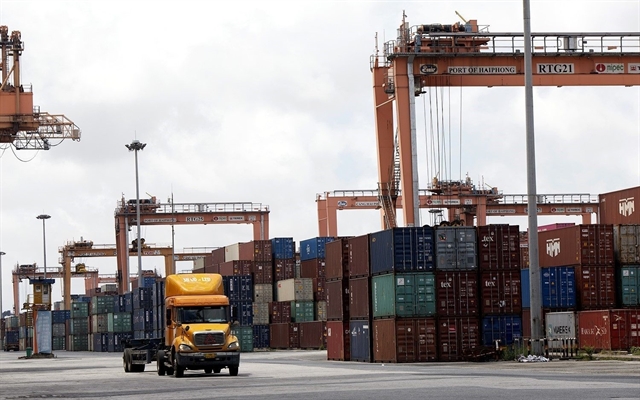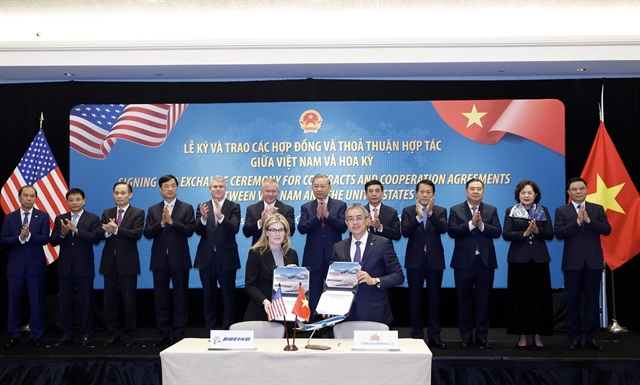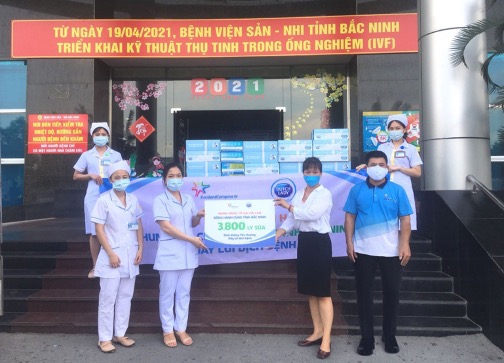 Economy
Economy

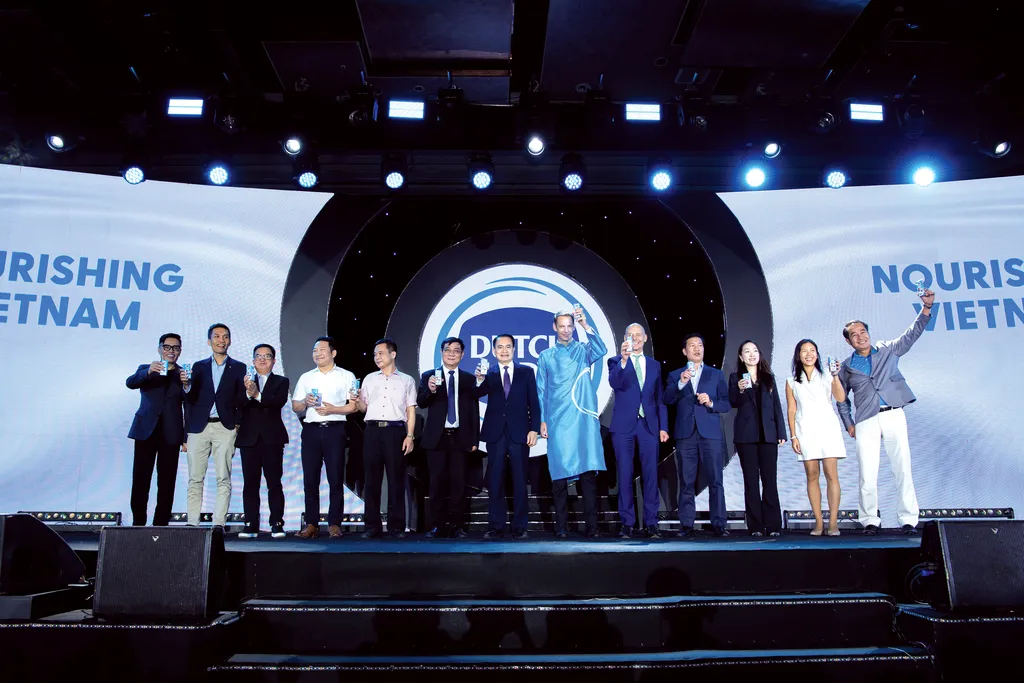 |
| FrieslandCampina has taken bold steps to restructure and expand its presence in key markets. — Photo Courtesy of the company |
HCM CITY — Amid global economic headwinds in 2024, marked by inflation, disrupted supply chains, and shifting consumer purchasing power, many multinational companies scaled back operations. Defying this trend, FrieslandCampina has taken bold steps to restructure and expand its presence in key markets.
In an interview with Việt Nam News, Jan Derck van Karnebeek, Global CEO of Royal FrieslandCampina, and Corine Tap, the firm's President of Asia, shared their insights about the company’s global strategy and its long-term commitment to “Nourishing Việt Nam," on the occasion of the relaunch of the Dutch Lady brand, highlighting FrieslandCampina’s continuous investment and innovation in the Vietnamese market.
Thank you both very much for the meeting today and welcome back to Việt Nam. We all know that 2024 was a tough year for most businesses around the world, and in that context, I would like to congratulate you both on the exemplary achievements of FrieslandCampina (FC) over the past year.
Jan Derck: I am grateful for what we accomplished together this past year. 2024 was a year of transformation for FrieslandCampina, characterised by the implementation of a new organisational model with seven business groups (BG), supported by a global supply chain organisation and efficient support services.
The results for 2024 prove that we are on the right path, and in 2025 and beyond we will continue to work hard on a future-proof and successful FrieslandCampina for members, employees, and all other stakeholders of this great company. The foundation we laid last year gives us much confidence for the future.
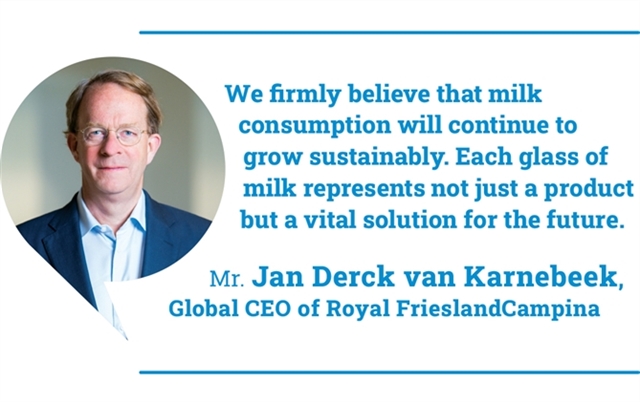 |
We know that BG Asia has successfully played its role, contributing to the overall accomplishments of FC. Can you elaborate on that aspect?
Corine: FC has always been a pioneer in Asia - and we’re the first to bring Dairy to this part of the world. Our mission as BG Asia is to provide access to nutrition to as many people as possible and this is needed because we know that there are still a lot of challenges when it comes to the nutritional status of families and children in Asia.
We are proud of what BG Asia has done to contribute to the overall business of FC. During my market visits, including to Việt Nam, I have seen first-hand the passion and dedication of our teams. I remember meeting parents who shared how our iconic brands like Dutch Lady and Alaska Milk have become part of their daily routine, and seeing our colleagues go the extra mile to make a difference. Moments like these remind me why what we do matters.
I know that this is your third visit to Việt Nam since you took the top job at FC. Can you share with us what brings you to Việt Nam this time?
Jan Derck: Both I and Corine, President of FrieslandCampina Asia, visit markets on a regular basis, and we see it as an important part of our jobs, to stay close to the needs of local consumers in countries where we operate, and support our local teams where required.
As Corine just mentioned, we are the first to bring dairy to this part of the world, and Việt Nam is not an exception. We started our operation here as early as 1995, and Dutch Lady was the first international nutrition brand to be present in Vietnamese households. FrieslandCampina is also the first multinational to develop a Dairy Development programme in Việt Nam, leveraging our over 150 years of dairy farming heritage, and hence, contributing to the overall development of the dairy sector in this country.
For both Corine and me, this visit is more than a regular working visit. We are here to celebrate the relaunch of our Dutch Lady brand in Việt Nam, marking a significant milestone in our 28 years in this wonderful market.
Before we hear more about the great relaunch of Dutch Lady which I had the pleasure to witness, can you both shed light on what are the most critical nutritional challenges of Việt Nam?
Jan Derck: Nutrition is a critical part of the health and development of nations. In its National Nutrition Strategy for the 2020-30 period and a vision to 2045, Việt Nam set the ambition that by 2045, every citizen will achieve their optimal nutritional security, and all nutrition-related non-communicable diseases will be under total control.
Việt Nam has considered Food Security, defined as accessibility and affordability of food, a national priority for decades, resulting in greatly increased food availability and affordability, and contributing to Việt Nam’s overall progress in improving its population’s health and well-being.
However, hidden hunger is presently the biggest and most critical challenge that Việt Nam is facing, and if not properly solved, will negatively impact the development of the country’s future generations.
Corine: The recently completed South-East Asia Nutrition Survey (SEANUTS II), a study of nearly 14,000 children, aged six months to 12 years that we conducted in collaboration with universities and institutions in Indonesia, Malaysia, Thailand and the National Institute of Nutrition of Việt Nam, highlights an important issue known as the ‘Triple Burden’ of Malnutrition, where micronutrient deficiencies are the most critical challenge.
According to SEANUTS II results, inadequate Nutrition Intake amongst Vietnamese Children 0.5-11.9 years old is: (i) 95 per cent not meeting Vitamin D intake; (ii) 81 per cent not meeting Calcium intake; and (iii) 66 per cent not meeting Vitamin C intake.
Scientific research has shown that kids with micro-nutrient deficiencies are more likely absent from school, more likely to have poorer academic performance and have hampered physical growth and development. In short, micro-nutrient deficiencies impact children’s future potential.
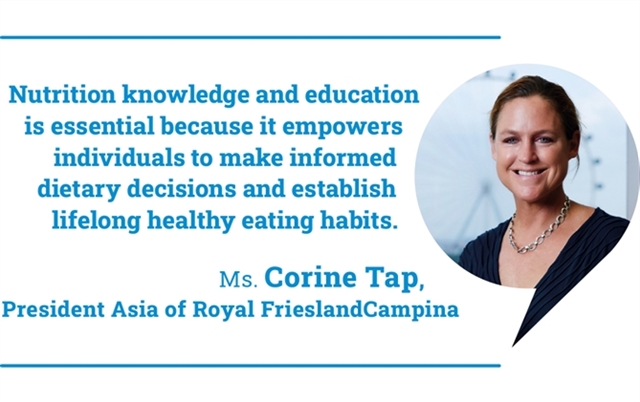 |
In the face of that most critical challenge, what can a global leading nutrition company like Frieslandcampina and a brand like Dutch Lady do for the future generations of Việt Nam?
Corine: With our 150 years of heritage and strong presence in over 100 markets globally, nourishing is our nature, our DNA. Guided by that purpose, we remain strongly committed to playing a role in providing access to better nutrition to Vietnamese people, especially to Vietnamese kids who are the future of the nation. We have believed in this mission since our Day 1 in Việt Nam and will continue to do so for the bright future of Vietnamese generations to come. And that is exactly what we aim to do with the relaunch of Dutch Lady that we mentioned above, thank you very much for witnessing this important moment together with us.
Can you share with our readers what is special about the relaunch of Dutch Lady?
Jan Derck: Fully understanding the critical nutrition challenges for Vietnamese people and children and guided by our strong belief that no child should be left behind due to inadequate nutrition, our Dutch Lady brand aspires and commits itself to providing Vietnamese children with the best nutrition so that they can independently take on whatever the day holds.
As I mentioned earlier, our SEANUTS II research highlighted that Vietnamese children aren’t getting enough nutrients that are essential for proper physical and mental development from their daily diet, particularly in Protein, Calcium, Vitamin D and Vitamin C.
New and improved Dutch Lady is now even more nutritious. It has been scientifically designed specifically for Vietnamese children to provide them with the nutrition they need: protein, calcium and Vitamin D for a strong body and now also fortified with Vitamin C for a strong immunity. With Dutch Lady every morning, moms and dads can be assured that their kids will have the strength to learn and grow everyday.
We have also ensured that the taste of our portfolio is loved by moms and kids and are bringing it all to life with an incredible new visual identity, bringing affordable nutrition to as many Vietnamese moms and kids as possible.
Yes, I have to say that I am quite impressed with what I witnessed at the relaunch ceremony. Congratulations to you all again. What, in your opinion, should both Government and businesses do to solve this critical nutrition challenge of Vietnamese kids?
Corine: Việt Nam’s National Nutrition Strategy is ambitious, and FrieslandCampina has always been ready to support this vision. To truly make an impact, we need more public-private partnerships that expand nutrition education and improve the accessibility and availability of affordable nutritious products.
In Việt Nam, we have developed cooperation programmes with NIN, the Việt Nam Women’s Union, and with our customers to that effect. We are also very pleased to see these angles are in alignment with the Key Tasks that the above-mentioned Việt Nam’s National Nutrition Strategy 2020-2030 has urged relevant government agencies to implement.
It should be noted that many consumer communities, especially underserved ones, are disadvantaged not only by limited access to nutritional foods but more by the lack of credible nutrition knowledge and education. Nutrition knowledge and education is essential because it empowers individuals to make informed dietary decisions and establish lifelong healthy eating habits. In today’s technologically connected world, where many people turn to social media as a source of information, there is a vital need for evidence-based nutrition education that reaches people where they are.
Looking ahead, what do you foresee for milk consumption in Việt Nam over the next few years?
Jan Derck: Việt Nam’s economy is rebounding robustly, with GDP growth translating into higher incomes, particularly in rural areas where nutritional needs still face significant gaps. The government is actively promoting a national nutrition strategy, facilitating access to essential foods. The responsibility now lies with us - not only to ensure a steady milk supply but also to align our offerings with nutritional needs and affordability.
We firmly believe that milk consumption will continue to grow sustainably. Each glass of milk represents not just a product but a vital solution for the future. — VNS

